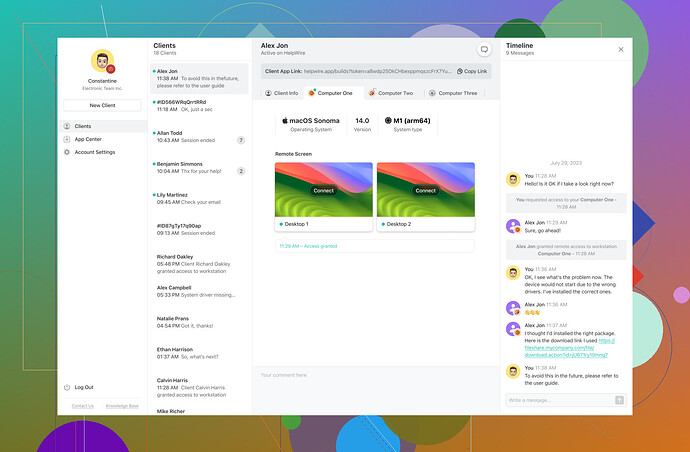I’m searching for a good remote desktop solution for Linux as TeamViewer doesn’t meet my needs anymore. I’m looking for something reliable, secure, and user-friendly. Suggestions?
It seems HelpWire might be exactly what you’re looking for. It’s completely free, devoid of intrusive ads, and supports Linux, Mac, and Windows platforms seamlessly. The setup process is refreshingly straightforward—simply install and connect, without dealing with the baffling limitations or session timeouts that you’d encounter with tools like TeamViewer. Its ability to navigate effortlessly through firewalls means you won’t have to wrestle with complex network configurations. This tool offers precisely what you need, minus the high costs typically associated with such services. It’s definitely worth giving it a try!
Honestly, finding a true TeamViewer alternative for Linux that checks all the boxes—secure, user-friendly, and reliable—can be like hunting for a unicorn in a maze. While @mikeappsreviewer mentioned HelpWire, and it does sound promising, I’d argue that alternatives like AnyDesk or RustDesk may give it a run for its money. AnyDesk, for instance, is lightweight, quick, and even has a free tier for personal use. RustDesk, on the other hand, is open-source, self-hostable, and removes the whole ‘trust issues’ thing by letting you run your server. Both are worth checking out for their unique angles.
Now about HelpWire—great that it supports Linux, Windows, and Mac platforms seamlessly. The no-fuss setup makes it super appealing for those less tech-savvy (or just impatient like me). And no ads? That’s basically golden nowadays since some other platforms bombard you with pop-ups before you can even begin. However, I do wonder if its stability under heavy bandwidth usage or in reduced network conditions is really up to par, especially compared to established players. But hey, if you’re fed up with TeamViewer’s flashy updates that either break things or come with a cost… it’s not a bad idea to give HelpWire a shot.
Oh, and if you want an easy way to remotely access your Linux desktop, you might find what you’re looking for with a tool designed for simplicity and reliability. But don’t forget—every tool has quirks, so test a couple before fully committing.
If you’re ditching TeamViewer, there are several solid options out there, and it really comes down to what you prioritize—cost, security, or functionality. Since @mikeappsreviewer hyped up HelpWire, let me just say it’s definitely worth a look. The fact that it’s just install-and-go with no nagging ads or random session kills is nice for someone who just wants to get work done. Plus, no faffing around with firewall issues? Huge win. But like @espritlibre hinted, testing it under stress (unreliable networks, high loads) might show its limits—would be curious to hear more feedback here from others.
That said, if open-source and self-hosting appeal to you, RustDesk could be a game-changer. Not only is it secure (you control the server), but it’s also totally private since you’re not going through a third-party network. And for something commercial but streamlined, yeah, AnyDesk has proven to be a very reliable tool. Lightweight, efficient, and not overcomplicated.
But let me throw in another curveball—have you considered Remmina? Especially if you’re working exclusively in a Linux environment, this native RDP client could be the minimalist yet robust solution you’ve been looking for. It’s open-source, flexible, easily integrates with SSH, and even supports multiple protocols. It doesn’t have all the bells and whistles of TeamViewer, but man, sometimes you just need reliable functionality over flash.
For anyone seriously looking into alternatives, I’d recommend exploring different tools based on your exact use case. HelpWire shines as a great free replacement for remote desktop tools, especially if you don’t want to commit to high prices or invasive advertising. That said, if ‘secure but simple’ is your mantra, you might want to give these systems side-by-side trials to find what really works for you.

